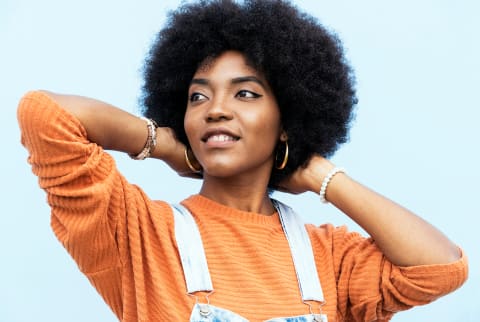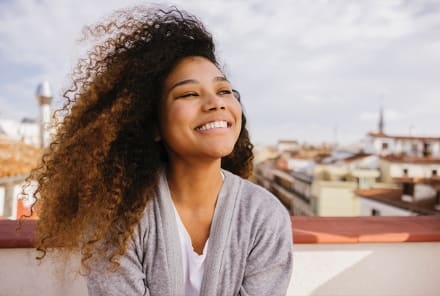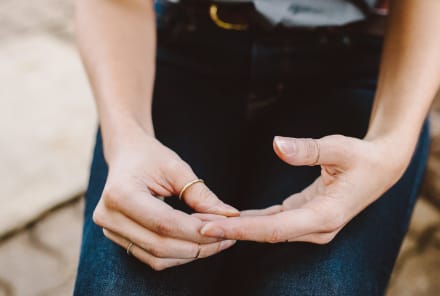Advertisement
A Simple Way To Nurture Love For Your Body Over Time, From A Sex Educator


Learning to love our bodies is less like flipping a switch on and more like moving through the seasons. Even people who know how to care for their bodies can periodically fall back into a phase of negativity and self-judgment.
And if your relationship to your body has been historically fraught, the start of a year can be a difficult time, as it often comes with a lot of people suddenly talking a lot about dieting and weight loss—topics that can often be laced with negative messages about what bodies are acceptable and which ones are not.
In a recent conversation with mindbodygreen, sexuality doula Ev'Yan Whitney shared a surprisingly simple, totally doable exercise for nurturing more love for your body during those times when your confidence wavers: a media mindfulness practice.
What is media mindfulness?
Media mindfulness is an intentional practice of observing everything that you're consuming on a daily basis, Whitney explained. That includes the articles you're reading, the shows and movies you're watching, the music you're listening to, everything you see on social media, and any other content you interact with regularly.
On a macro level, our culture plays a huge role in shaping any one person's body image, Whitney said—and the research certainly backs that up. Many studies have linked social media use with increased body image issues1 and disordered eating, with one 2017 study2 showing women feel worse about their bodies when viewing "fitspiration" images on Instagram. We're constantly inundated with messages about what our bodies should and shouldn't look like. In other words, you're really not individually to blame for not feeling great about your body.
"Our culture thrives, and capitalism thrives, on our ability to hate our bodies," Whitney explained. "There's nothing wrong with you. You are not broken. The culture is broken, and you are just a product of what is being infused and impressed upon you on a daily basis, sometimes without you even thinking about it."
Once you recognize the ways in which the media contributes to your feelings of disconnection from your body, they added, you can then start to manage or minimize your exposure.
"It's my responsibility to make sure that any sort of media that I'm consuming—any sort of messages that I'm getting from friends, not even just from the media, but family and stuff like that—it's my job to make sure I'm filtering those things and that I'm being very mindful and proactive," they explained. "I get to choose which messages that I internalize, and I get to create boundaries around the people, places, and things that take me out of my body."
A media mindfulness exercise to try.
So practically speaking, how do you put all this into action? Here's one exercise Whitney shared with us from their coaching practice:
Observe.
Spend a week or two being very, very mindful of everything you're consuming, including social media, TV, movies, music, and any other content.
"Also be mindful about when you're watching these things, what sort of messages or self-talk is coming up within you? Because oftentimes we're just consuming this stuff, and then we walk away feeling lousy, and we don't really know why," Whitney explained. "So I'm asking my clients to slow down, be a little bit more mindful, turn their eye to it."
Spent 10 minutes scrolling through a random beauty influencer's IG feed, only to emerge feeling suddenly terrible about your skin? Note that. Watched a movie where all the characters written as being desirable were played by white people and all the "losers" were played by people of color? Write down how that landed for you.
Eliminate.
By the end of the week, you'll have a whole assessment of everything you've consumed and how it made you feel, Whitney said, and from there you can start to notice any trends. Based on what you find, start removing any content that you notice consistently makes you feel bad about your body.
"Now I have a sense of what could be my potential triggers, I have a sense of the things that I need to steer clear from, and I'm going to get rid of it," Whitney said. "I'm going to minimize my exposure to that."
Mute those IG accounts, pass on the non-diverse movies, bow out of those conversations when friends start analyzing how "bad" their lunch was for them—whatever isn't serving you can be released. As Whitney explained, this is a practice of setting boundaries for ourselves.
You won't be able to cut out all the negative messages, of course, because they really are all around us and nearly impossible to fully eliminate. But full elimination isn't the point, Whitney said: "If we're really taking steps to manage the messages that we're getting via television shows, songs, movies, and things like that, when we see that billboard when we're driving, it's just like—oh yeah, that's not real! I'm not going to let that bother me."
Get back to balance.
The point of media mindfulness isn't to keep yourself in a bubble forever, Whitney noted. "Sometimes that can be helpful for folks, but I think that that's unsustainable just because we would probably not be able to watch television anymore." Fair.
The point, instead, is to simply clear out space for you to recalibrate and get grounded in the reality: that your body is worthy of love and celebration, exactly as it is now. That the messages we get from the media about our bodies aren't the messages we need or should internalize.
Do the work that you need to do to re-establish a positive relationship with your body again. "Then whenever you feel like you have some fortitude, a sense of grounding about who you are, what your body is, the messages, the values, the intentions that you want to bring into yourself, slowly start introducing those things," Whitney said.
Go ahead and refollow those celebs or start watching one of those shows again. Those images or messages might still rattle you when you start to come across them again, Whitney noted. "But oftentimes what I found in my clients is that they do this for a week or for a month, and by the end of it, they're like, oh, I'm able to see these images...and they don't rattle me as much. It certainly gives me that jolt of—ugh, it makes me feel some type of way—but it doesn't bump me off of my axis as much."
As you build up your connection to your body and your confidence in your body beliefs, you'll find your body image strengthening over time with more and more resilience.
Watch Next
Enjoy some of our favorite clips from classes
Enjoy some of our favorite clips from classes
What Is Meditation?
Mindfulness/Spirituality | Light Watkins
Box Breathing
Mindfulness/Spirituality | Gwen Dittmar
What Breathwork Can Address
Mindfulness/Spirituality | Gwen Dittmar
The 8 Limbs of Yoga - What is Asana?
Yoga | Caley Alyssa
Two Standing Postures to Open Up Tight Hips
Yoga | Caley Alyssa
How Plants Can Optimize Athletic Performance
Nutrition | Rich Roll
What to Eat Before a Workout
Nutrition | Rich Roll
How Ayurveda Helps Us Navigate Modern Life
Nutrition | Sahara Rose
Messages About Love & Relationships
Love & Relationships | Esther Perel
Love Languages
Love & Relationships | Esther Perel

















